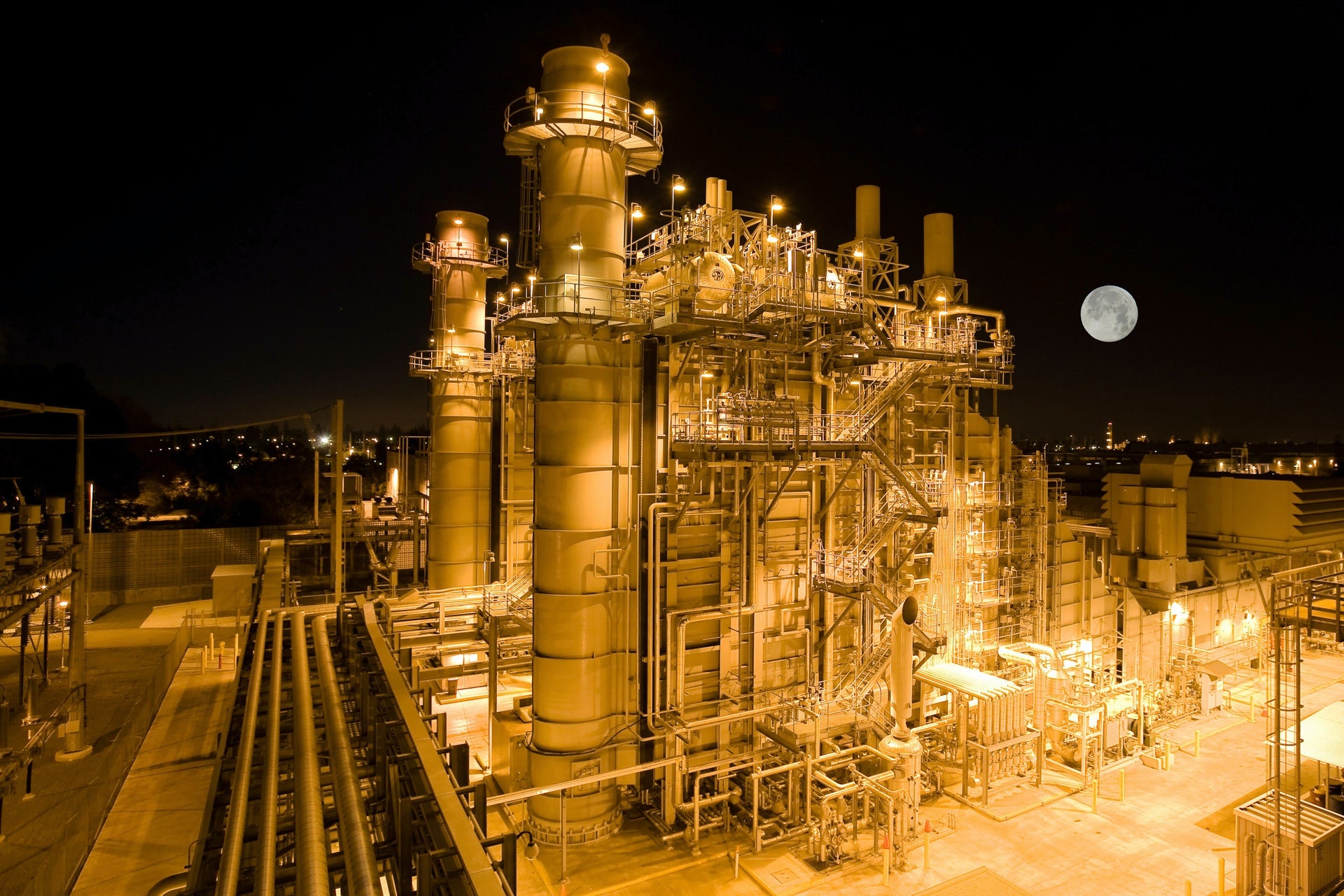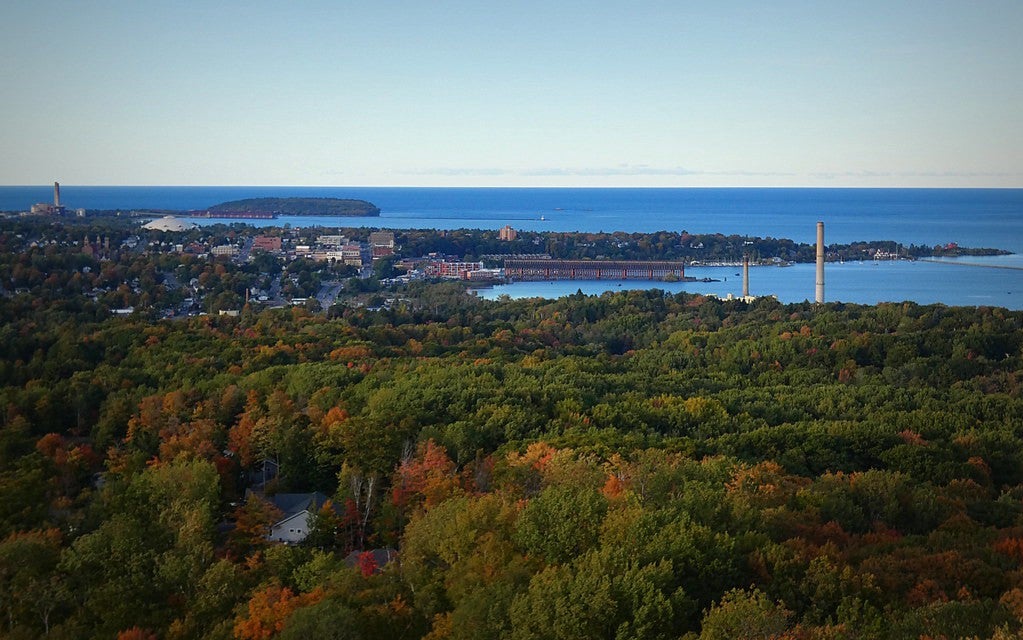Transatlantic Learning Exchange: Economic Renewal and Democracy

John Austin shares insights from a transatlantic convening that explores the political repercussions of economic inequality and extremist ideology.
"Ownership of their own future." "Locally owned and operated solutions." "Building on identity and history." "Rediscovering pride in community." "Avoiding 'bullhorn’ politics.'"
These were some of the important insights shared by leaders from both sides of the Atlantic into what makes for effective work in economic transformation and, by extension, democracy preservation, at our recent discussion of Industrial Heartlands and Democracy.
The transatlantic learning exchange, organized and hosted by the European Union Committee of the Regions and the European Commission’s Directorate-General for Regional and Urban Policy, saw discussion of the vital importance of nurturing economic renewal in industrial heartland regions in order to blunt the appeal of extremist politics. The event attracted the participation of more than 500 leaders and economic change practitioners representing North American and European democracies and provided new guidance for leaders on how to spur and support industrial heartland economic transformation.
The event featured US Representatives Ro Khanna and Cheri Bustos, as well as State Secretary Mark Speich of the German State of North Rhine-Westphalia, who joined mayors from Spain, Poland, France, the United States, and Canada. All illuminated the link between vibrant local economies, good jobs and employment opportunities, and a politics of moderation, not polarization.

The discussion generated additional insights to those gleaned from a similar international symposium hosted by the Chicago Council last year, and was the latest in a series of transatlantic learning exchanges organized as part of the Transforming Industrial Regions Initiative, a partnership between the Chicago Council on Global Affairs, Georgetown University’s BMW Center for German and European Studies, the Michigan Economic Center, Policy@Manchester at the University of Manchester, the Ruhr Konferenz, the German state of North Rhine-Westphalia, the consulate general of the Federal Republic of Germany in Chicago, and the European Commission’s Directorate on Regional and Urban Policy.
The June 2022 discussion reported here drew together policymakers from across Europe and North America representing industrial regions in economic transition—regions that present unique geographic, economic, and cultural features, but that also share many commonalities in the arc of their economic and cultural development.
At this most recent dialogue, participants traded ideas around innovative strategies—how to create new, high-quality jobs by steering industrial revitalization towards environmental sustainability; tactics for empowering local communities in decision-making; fostering community and regional cohesion and collaboration; and, ultimately, how to best blunt the appeal of antidemocratic politics.
The event showcased the tools and tactics used by leaders of these communities, who object to the characterization of their people and places as “left behind,” and who help lead change rather than react to it. These leaders are motivated to help residents of industrial heartland regions to newly find their economic footing on both sides of the Atlantic.
The following shares major insights from this robust transatlantic discussion. These include the importance of understanding the underpinnings of these political changes, as well as forging a path forward based on community pride, leadership, diversification, and community engagement and collaboration.
Understand the Underpinnings
Residents of once thriving, now ailing industrial heartlands feel enormous frustration and anxiety, driven in part by the speed and magnitude of the economic collapse their communities experienced. Participating mayors described the scale and impact of the loss of jobs and the visible deterioration of community in vivid and often brutal terms.
Mike Bradley, Mayor of Sarnia, Ontario, told his town’s story:
Sarnia was a petrochemical town. We had the highest per capita wages in the country. Then in the 80s and 90s started to lose thousands and thousands of jobs, remember out of a population base of 75,000. Touching one of every 10 households, it was like something out of the Bible. [It] led to a lot of bitterness.
Mayor François Decoster of Saint-Omer, France, described his constituents’ economic and emotional trauma, as his region—with an economy based on coal, metallurgy, and auto parts-manufacturing—saw its share of industrial sector jobs fall from a high of 60 percent decades ago, to only 12 percent in 2014. “Quickly, brutally, jobs in the sector were lost. It was a violent change. Huge drop in industrial sector jobs. A brutal, even violent downturn.” He continued: “Once this region enjoyed the [same] economic prospects of the nation as a whole […]. Then residents went through such a change, such a loss of employment.”
State Secretary Speich of North Rhine-Westphalia, home of German industrial heartland of the Ruhr Valley, echoed the theme: “The magnitude of the structural change was enormous. We were the heart of the coal and steel region. At one point we had half a million employed in coal […]. We just recently closed our last pit,” the State Secretary noted, emphasizing the scale of the transition.

The political fallout from this economic freefall is clear. In France, these struggling former industrial regions have seen growing support for far-right candidates. The Pas-de-Calais department within the Hauts-de-France region, home of Saint-Omer, has evidenced some of the strongest support in the country for far-right presidential candidate Marine Le Pen in the last two elections. In the 2022 presidential election, support for Le Pen in Pas-de-Calais increased five percentage points, a margin much higher than in other parts of France without a history of industrial job loss.
Much of the day’s discussion revolved around the human and emotional toll of the loss of livelihoods and pride, and the potential for harm to our democracies by populist movements as voters’ anger and frustration finds outlets in support for anti-democratic populist movements and authoritarian, nationalist leaders.
US Congressman Ro Khanna of California described job losses in an Illinois town he visited that had seen its anchor employer close its doors, idling 5,000 workers, as a catastrophic watershed for the community. He recalled speaking to residents: “They remember it vividly from 20 years ago. It wasn’t just the destruction of their jobs; it was the destruction of their community […]. We have to acknowledge our economic model is broken … we have to fix our mistake [leaving these types of people behind] that led to the election of Donald Trump. It led to Brexit.”
As members of the Transatlantic Industrial Regions Initiative have noted, the long-term socio-political effects of rapid decline in manufacturing and job opportunities has already generated challenges to democratic institutions and principles on both sides of the Atlantic. We must learn to meet these challenges if we are to secure our democracies.
The Path Forward
Participants offered important starting points and guidance on the paths and processes to renew industrial heartland regions and refresh the optimism and restore dignity to these communities’ residents. The work revolves around restoring pride, providing visionary and collaborative leadership, diversifying and developing new, high-quality job opportunities, and meaningful community engagement.
Restoring Pride
Much of the discussion focused on the pernicious emotional impact of the loss of solid working-class jobs and the deterioration of once-vibrant communities. The outflow of young people, the diminished opportunities for workers, and the physical degradation of community all combine to dent the pride of residents in heartland communities.
Mayor Decoster of Saint-Omer emphasized the necessity of local leaders to address the psychological costs, in addition to the economic loss their constituents had experienced:
“It is so important for residents to rediscover their pride. We had to return pride to the people, along with prosperity. We had to move our culture from our industrial past, from our mining past. But we built on this cultural heritage. We put the region on the UNESCO World Heritage list, repurposed all these historic architecture and buildings. We wanted to now attract new companies and campuses. We attracted a new wave, we brought a new offshoot of the Louvre Museum, and other new museums … [a celebration of our history] that increased pride again in the region […]. We did all this ten years ago, and now we can look back and say: Yes! We are proud of this history; we can be proud of our community again.”
Mayor Bradley of Sarnia, Canada, and Mayor Steve Patterson of Athens, Ohio, echoed the sentiment, underscoring the centrality of tangibly creating new jobs and economic opportunities and building on the communities’ identity carried from the past. Attracting new employers in emerging sectors to their regions works to restore optimism and rekindle a sense of self-determination to residents of their communities.
Midland, Michigan, Mayor Maureen Donker described her community’s journey from a one-company town to creating new jobs and businesses for retaining and attracting residents. She described the work as a war for talent. “The first step in that war is to restore our own residents’ confidence and pride in their community. They want to be proud of our town.”
Lead and Look Ahead
Good leaders go about restoring pride by helping their community come together and look ahead, constructing a new vision for their future.
Sarnia’s Mayor Bradley, facing a bitter and angry community after a job loss of “biblical” proportions, convened the entire community:
"We brought together business, labor. Our First Nation. We even brought the naysayers in […]. We asked the question: 'Where do we want to go? Where do we want to be as a community in 10-15 years?' Coming together we started to change the direction of the community."
In industrial heartland communities whose identity and economy were historically shaped by industry—whether chemicals or steel, autos or machine tools—there is understandable nostalgia. Some residents demand leaders magically bring back the economy of yesteryear and are reluctant to try and look ahead. As Mayor Bradley also put it: “There are resistors. There are those who say we don’t have to change.” His insight and message to other mayors and local leaders: “You can lead the change [and succeed], or you can react to it, and you will lose.”
Effective local leaders find ways to build on the community and its historic roots to reinvigorate residents’ pride in themselves and their community. As Saint-Omer’s Mayor Decoster noted as he narrated his community’s journey to recapture pride by honoring its past and defining the steps to build new economic opportunities for the future: “It is the up to our political leaders to share a new message of hope.”
A vital ingredient in communities that have managed a successful economic evolution is skillful and creative leadership that stays close to and engages openly the total community as they help envision and then lead the movement to a new economic future. As the EU’s Peter Berkowitz observed at the end of the session: “Local leadership is the ‘x’ factor that can change places. [We need to] distil that essence—understand that ‘x’ factor.”
A Good Job is Key: Diversify and Seize New Opportunity
A community’s ability to navigate and benefit from economic change, versus being flattened by it, is tied up in the pride, dignity, and confidence generated by decent jobs. To get to the promised land of a rebooted employment base, communities that were previously “one-trick ponies”—in the words of the EU Parliament Research Service’s Fearghas O’Beara, facilitator of the discussion—have to diversify.
Climate-friendly industrial growth is one path found by many of the participating policymakers and a viable step forward in reinvigorating industrial regions. Mayor Patterson of Athens, Ohio, described the work of himself and a network of Ohio River Valley communities and their mayors—a region historically dependent on fossil fuels and extractive industries. Several years ago they came together and established the Marshall Plan for Middle America, a coalition of policymakers and stakeholders to encourage investment in the renewable energy sectors of the participating states.
Besides the environmental benefits of transitioning to clean energy, Mayor Patterson hailed the benefits of new jobs for those who have or will lose their jobs in the fossil fuel industry as the economy shifts. As a result of their collective efforts, the Biden administration increased investment in the Ohio Valley. Mayor Patterson described some of those results:
In places like Huntington, West Virginia, we are seeing new battery manufacturing, bringing 350 new jobs for people displaced from the coal industry. Those losing jobs in the mining sector are today getting jobs in the clean energy sector.
Mayor Bradley of Sarnia, Canada, detailed the community’s successful evolution from a city almost entirely reliant on the petrochemical industry to one that embraces renewable energy, education, and innovation. As the mayor related, once his community came together with a vision and a plan, they went to work developing a new research park, turning the smallest university in Ontario into a top-tier institution with a new applied research center. The city also leveraged the growth of the bio-economy and developed a Bio Innovation Center. Today Sarnia is the city with the largest solar farm and largest ethanol plant in Canada, and a leader in hydrogen and biofuels.
European leaders long have been focused on building out the green economy as a key driver of economic structural change. Saint-Omer Mayor Decoster also discussed the journey to a new economic model to replace lost industrial sector jobs with new green jobs. “The ecological transition is guiding our work. Carbon neutrality 2060 goals are guiding our work … developing new areas of economic activity, and new niche markets. Now as those new opportunities are being found we have drawn a full circle, back to our starting point ... to a new era of economic opportunity.”

There are other important strategies to create good new jobs. Midland, Michigan, Mayor Donker pointed to the importance of quality of life and place in “winning the war for talent,” diversifying the employment base, and reversing the brain-drain that many industrial centers were experiencing.
North Rhine-Westphalia State Secretary Speich outlined the power of colleges and universities as a fulcrum for economic renewal. Over many decades, his coal- and steel-dependent Ruhr region purposefully located new higher education research and learning institutions in former industrial communities as engines for economic development in emerging sectors, noting that when there were hundreds of thousands of coal jobs in the region, there were no colleges and universities. But through purposeful investment in research and learning institutions as catalysts for innovation, talent generation, and business growth, today the region sports Germany’s most dense network of higher education institutions.
Ultimately, any movement from the old economy to the new, from “dirty” to “clean” industry, must meet the communities’ needs for solid employment and avoid dramatic labor dislocations, even as the transition delivers broad social and environmental benefits. As Anne Hetman, Mayor of Jastrzębie-Zdrój, Poland, shared: “People need to experience a transition that delivers benefits. Transformation that is not a revolution that will catch local communities in a bind.”
Creative Community Engagement
Another critical component of nurturing effective transformation is the work of local leaders to find new and creative ways to engage, empower, and enlist the help and trust of their citizens in shaping and implementing their communities’ evolution and change.
In Midland, Michigan, the mayor, along with the city council and business and civic leaders, came together to develop community-centric plans through their Community Success Panel. According to Mayor Donker, the goal of these monthly panel meetings is to “envision the community’s best future and align our efforts.” In this work they have fostered a community vision and a continually updating strategic plan, including defining performance in key areas to achieve that vision.
Mayor Donker related elements of their strategy and its successes: Midland focused on building quality schools and fostering arts and culture. They lifted a community wellness program model from Australia. They rebranded themselves the Great Lakes Bay Region to communicate the lifestyle opportunities. They sought and won a Baldridge Community of Excellence Prize. Their model illustrates one path to inclusive, strategic, community-led planning in heartland revitalization, one that is ultimately about empowering residents to define their own future.
In Saint-Omer, Mayor Decoster, in describing the community renewal process that was built in part on a celebration of their industrial history, notes, “We did not do this from the top-down, it was a participatory process. The community asked for and was engaged in the process.” He encouraged the group: “We need to continue this [transatlantic] dialogue sharing best practices in citizen participation, what is innovative in citizen participation the exchange of views.”
Athens, Ohio Mayor Williams noted their effort to engage the community in new ways, in “reimagining” their municipality. “In Athens we came together … to reimagine our community—76 percent of residents voted to pass a ballot initiative to pay for retrofitting the whole community for clean energy and sustainable systems. In so doing bringing a new and different form of manufacturing back.”
Community empowerment also includes an openness on the part of leaders to be available to constituents, to listen open-ended to their concerns, to even “walk a mile” in their jobs and shoes. Congresswoman Cheri Bustos related her tactics for staying close to constituents, including what she calls “Cheri on Shifts,” where she works alongside her constituents in various occupations to understand what they face in their life and work.
Perhaps most poignantly, Midland Mayor Donker, in describing her work and that of her peer leaders in industrial heartlands undergoing a significant transition, said it was all about learning to support their constituents in the tough work of economic adjustment and change. A mayor’s job, she argued, was to learn how to “help our people to struggle well.”
Collaborate Across Boundaries
“Collaboration, collaboration, collaboration” was the directive to other local leaders and the mantra of Sarnia Mayor Bradley, informed by his 34 years in office. Mayor Bradley noted from his experience that a successful transition requires a collective, coordinated effort from community members, businesses, labor, and local governments within his own locality, but also across regions. “We collaborate across the region [Southwest Ontario]—with London, with Windsor, and Sarnia.”
Thomas Wobben of the EU Committee of the Regions offered another example of new collaboration, as he related his history as a German regional leader, and the virtues of pulling together regions that were dependent on the chemical industry.
"Business and political leaders in these regions did not used to talk to each other—they thought they were competing, but then realizing that by talking to each other... business leaders with other business leaders, and the regional leaders with their peers… they could collaborate to find solutions to common problems."
Mariví Monteserín Rodriguez of Aviles, Spain, discussed the virtues of developing a network of communities across Europe focused on growing new sustainable industries, sharing best practices, and maintaining open channels of communication. While participants represent regions with vast differences, the fundamental methods best suited to reinvigorate them transcend borders, with the experiences of other communities borrowed and modified to suit one’s own community’s needs and conditions.
Reinforcing these points, moderator Fearghas O’Beara drew this current of common themes from the discussion around how mayors managed economic regeneration and diversification: “Reach across regions… reach across borders… develop a joint strategy.”
Economic Renewal and Democracy Preservation
Finally, the discussion returned to the relationship between the health of the local economy and the health of political discourse—otherwise known as the politics of place. The exchange of ideas at the summit offered powerful insights into the nature of the interplay between the work of economic rejuvenation and improving the processes of democracy. O’Beara noted, “In industrial heartlands, we do have to worry about our democracy. We have people that are losing hope, being disillusioned, and we get all the damage that comes with that disillusionment.”
Noting that even a small minority of alienated citizens can wreak economic havoc and do disproportionate political harm, Sarnia Mayor Bradley related his experience with the blockade of his border town that infamously paralyzed commerce between nations in Canada’s so-called “truckers strike”: “These folks are not about freedom, and certainly are not the real truckers that handle all the important [cross-border] traffic.… But don’t underestimate the degree of damage a small cult can do. All the really bad movements in history started with very small number ... shows what damage that three-to-five percent of population can do.”
The event underscored that the hard work of ensuring citizens are not “left-behind” is a strong salve for the political polarization that has threatened democracies. To ensure an inclusive model, economic regeneration must draw heavily on local culture and expertise in order to most effectively diminish the appeal of polarizing populist messages. Place-based approaches to reverse economic decline can, as the discussion illustrated, embrace the culture and historic identities of industrial heartlands, respect the experience of constituents and empower them in decision-making, and ultimately succeed at diversifying the local economy.
Mayor Decoster reminded the audience of what was at stake in not attending to the economic changes in once thriving heartland regions: “Deindustrialization really does transform society, leading to civil unrest and a radicalization of politics.”
Conclusion
The political repercussions of extremist ideology, exacerbated by economic inequality, are already felt around the world through the elections of figures like Donald Trump and Viktor Orbán and the increasing popularity of candidates like Marine Le Pen. To prevent further erosion of political norms and corruption of democratic institutions, urgent, collaborative, transatlantic action is needed.
Sustained international cooperation across the Atlantic as embodied in this recent convening, and in the ongoing work of the transatlantic industrial heartlands partnership and initiative, can help to shine a spotlight on the importance of industrial heartland transformation to the healing of our politics, and facilitate the sharing of ideas and best practices. Peter Berkowitz of the EU Directorate for Regional and Urban Policy noted in his closing comments, “We are at a moment when we face challenges to our European integration model and our democracy…. Forces that are a threat to our model of democracy, mean we have to work together.”
As leaders at the event emphasized, by working together, once prosperous industrial heartland regions can indeed find economic renewal, new pride, and with it new optimism. They can resist the politics of resentment and “us-vs-them,” which serves to diminish the appeal of extremists everywhere and secure democratic processes and economic stability for future generations.
As North Rhine-Westphalia State Secretary Speich eloquently and succinctly said at the closing of the event: “New optimism, new pride, new dignity in new jobs … helps preserve democracy.”
Antonella Davi, an MPA candidate in international security policy and urban policy at the Columbia School of International and Public Affairs, contributed to the research and writing of this report.


Transforming Industrial Regions Initiative
We are building a network of policy practitioners, academics, and political leaders focused on economic revival in industrial regions of North America and Europe.